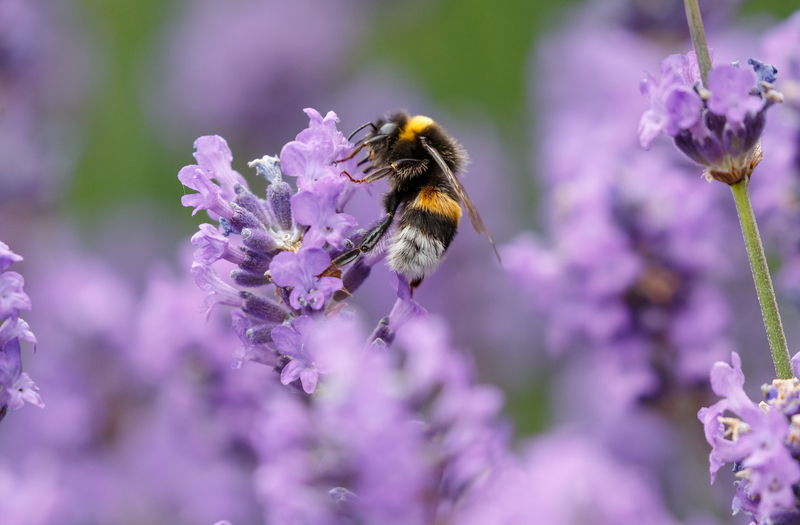Transforming Organic Scraps into Enriched Soil for Thriving Gardens
Posted on 24/09/2025
Transforming Organic Scraps into Enriched Soil for Thriving Gardens
Enriching your garden's soil doesn't require expensive fertilizers or chemical amendments. By harnessing the natural process of composting organic scraps, you can transform kitchen and yard waste into nutrient-rich soil that fosters healthy, robust plant growth. This comprehensive guide will walk you through the process of turning organic waste into enriched garden soil, exploring the methods, benefits, and tips for creating a thriving, sustainable garden ecosystem.
Why Transform Organic Scraps into Garden Soil?
Every year, millions of tons of organic waste end up in landfills, where they decompose anaerobically and generate methane, a potent greenhouse gas. Transforming these scraps by composting not only diverts waste but also returns valuable nutrients to the soil, reducing the need for synthetic fertilizers. The result is a healthier, more vibrant garden that supports biodiversity and environmental sustainability.
Key Benefits of Converting Organic Waste to Soil
- Reduces landfill waste and lowers carbon footprint
- Improves soil structure and water retention
- Fosters microbial activity essential for plant health
- Boosts nutrient levels in garden beds
- Suppresses plant diseases and pests naturally

The Science Behind Composting: How Organic Scraps Become Enriched Soil
Composting is a natural biological process where microorganisms, fungi, and invertebrates break down organic matter. The process transforms kitchen and yard waste into humus -- a dark, crumbly substance rich in nutrients. This enriched soil amendment improves the structure, fertility, and overall health of garden ecosystems.
The Four Essential Elements for Successful Composting
- Carbon (Browns): Dry leaves, straw, cardboard, and paper provide energy for microbes.
- Nitrogen (Greens): Kitchen scraps, grass clippings, coffee grounds, and fruit/vegetable peels promote growth and reproduction of composting organisms.
- Oxygen: Essential for aerobic decomposition; achieves by turning and aerating the pile.
- Water: Keeps materials moist, aiding breakdown. Too much water, however, can turn the pile anaerobic and cause unpleasant odors.
Composting Methods for Transforming Organic Scraps into Rich Garden Soil
There are several effective techniques for converting organic waste into productive soil for your garden. Below are the most popular composting approaches:
1. Traditional Backyard Composting
- Open Piles - Simply pile organic materials in a corner of your yard. Regularly turning the pile helps with aeration and speeds up decomposition.
- Compost Bins - These containers hold compost neatly and can deter pests. You can choose from stationary bins or rotating tumblers to mix scraps more quickly and easily.
Tip: Maintain a proper carbon-to-nitrogen ratio (about 30:1) for best results. Alternate layers of "browns" and "greens" to balance nutrients and avoid odors.
2. Vermicomposting (Worm Composting)
This method employs red wiggler worms to consume and digest kitchen scraps, resulting in worm castings or vermicompost -- an especially nutrient-dense form of enriched soil for gardens. Worm bins can be set up indoors or outdoors and are perfect for urban gardeners with limited space.
3. Trench Composting
- Dig trenches (about 12-18 inches deep) in your garden beds.
- Layer kitchen scraps and organic materials into the trench, and cover with soil.
- The materials break down in place, directly enriching the soil for future plantings.
4. Bokashi Composting
The Bokashi technique utilizes anaerobic fermentation to break down food scraps, including meats and dairy (which aren't compostable via traditional aerobic methods), in a sealed container. Once fermented, the material can be buried in soil to finish decomposing, enriching the garden with a wider variety of nutrients.
What Can (and Can't) Go Into Your Compost?
Acceptable Organic Scraps for Rich, Garden-Ready Compost
- Fruit and vegetable peels
- Coffee grounds and filters
- Eggshells (crushed)
- Tea bags (ensure they are plastic-free)
- Grass clippings and yard trimmings
- Dead leaves and woody stems (shredded for faster breakdown)
- Paper towels, napkins, and cardboard (avoid glossy/colored prints)
What to Avoid in Your Compost Pile
- Meat, dairy, and oily foods (unless using Bokashi)
- Pet wastes
- Diseased plants
- Weeds that have gone to seed
- Glossy or colored paper products
- Plastics, metals, or glass
Careful sorting of organic matter ensures a safe and effective transformation from scraps to enriched garden soil.
How to Build and Maintain a Productive Compost Pile
The journey to thriving garden beds begins with a healthy compost heap. Here's a step-by-step guide:
Step 1: Choose Your Location
- Select a well-drained, shaded spot for your compost pile or bin.
- Ensure easy access so you can regularly add scraps and turn the pile.
Step 2: Layer Materials
- Start with a layer of coarse material (sticks or straw) for aeration at the bottom.
- Alternate layers of green (nitrogen-rich) and brown (carbon-rich) materials.
- Sprinkle with water if layers seem dry - keep the pile as damp as a wrung-out sponge.
Step 3: Aerate and Monitor
- Turn the pile every couple of weeks with a pitchfork or compost aerator.
- If the pile smells, add more browns or turn for more air circulation.
- Check moisture levels and add water if too dry, or browns if too wet.
Step 4: Harvesting Your Enriched Soil
After several months (2-12, depending on method and climate), your compost will be dark, crumbly, and earthy-smelling -- ready for use. Sift to remove large chunks, using the fine compost to amend your garden beds, top-dress lawns, or enrich potting mixes.
Using Enriched Soil to Cultivate Thriving Gardens
When your compost is ready, it's time to introduce this black gold to your garden. Here's how:
1. Preparing Bed and Borders
- Work compost into top 4-6 inches of garden soil before planting to boost nutrient levels and improve structure.
- Top-dress around established plants to gradually release nutrients and suppress weeds.
2. Mulching and Soil Amendment
- Spread a layer of compost as mulch to moderate soil temperatures, prevent erosion, and retain moisture.
- Mix compost with native soil for container gardens or raised beds to enhance plant vigor and productivity.
3. Compost Tea for Garden Health
- Make a nutrient-rich liquid fertilizer by steeping compost in water (1:5 ratio) for several days, stirring occasionally.
- Apply tea directly to plant roots or as a foliar spray for boosted growth and disease resistance.
Frequently Asked Questions about Converting Organic Waste to Enriched Soil
How long does it take for organic scraps to become usable garden soil?
Depending on your composting method, environmental factors, and type of materials used, the process can take between 2 and 12 months. Fast methods like hot composting and tumblers can produce results in 2-3 months, while cold or passive piles may take a year.
Can I compost year-round?
Absolutely! Composting can continue throughout the year, though decomposition slows in winter. Insulating piles with leaves or straw and keeping them moist will maintain activity during colder months.
Will composting attract pests?
Properly managed compost piles (avoiding meat, dairy, and oily scraps, maintaining thermal activity, and securing bins) should not attract pests. Burying food scraps and turning the pile regularly helps deter rodents and insects.
Tips for Effective Transformation of Organic Scraps into Nutrient-Rich Soil
- Chop food and yard waste into small pieces for faster decomposition.
- Maintain a balanced mix of browns and greens to optimize microbial activity and avoid odors.
- Monitor temperature of the pile; active decomposition generates heat (ideally 130-160?F) that accelerates the composting process.
- Sift finished compost to separate any non-broken-down materials, returning large pieces to the pile.
- Keep a compost pail in the kitchen for easy collection of scraps and regular transfer to your backyard pile or bin.
Advanced Techniques for Superior Enriched Soil
Leaf Mold
Collected autumn leaves left to decay on their own become a soil conditioner known as leaf mold. This substance dramatically improves soil structure and water retention in garden beds, particularly beneficial for ornamental gardens and woodland plants.
Biochar
Biochar is charcoal used as a soil amendment -- it locks in carbon and provides a habitat for soil microbes, enhancing overall fertility. Mix biochar with compost before applying to garden soil for a potent, long-lasting enrichment.
Lasagna Gardening
This no-dig approach layers organic scraps, yard waste, and mulches directly onto garden beds. Over time, the layers "cook down" into a deep, fertile loam, perfect for planting directly into the following season.

Environmental Impact: How Home Composting Supports Thriving Gardens and a Healthier Planet
Transforming kitchen and garden scraps into enriched soil is an act of environmental stewardship and garden empowerment. By closing the loop -- returning nutrients to the earth -- you reduce landfill use, conserve resources, and cultivate healthy, resilient gardens capable of supporting diverse plant life, pollinators, and beneficial insects.
- Home composting eliminates the need for synthetic fertilizers, whose produksion and use can cause pollution and greenhouse gas emissions.
- Enriched organic soil holds more water and nutrients, reducing irrigation demands and fertilizer run-off into local waterways.
- Healthy soil acts as a carbon sink, helping mitigate climate change over time.
Conclusion: Start Transforming Organic Scraps into Enriched Soil Today!
Whether you're a seasoned horticulturist or a novice gardener, the benefits of turning organic scraps into rich garden soil are immense. With a variety of composting techniques at your disposal--traditional piles, worm bins, trenching, or Bokashi--you can easily upcycle kitchen and yard waste into a powerful resource for your garden. Not only will you nurture thriving plants, but you'll also play a vital role in building a greener, more sustainable world.
Transform your organic scraps into enriched soil, and watch your garden - and the planet - truly thrive.
Latest Posts
Transforming Organic Scraps into Enriched Soil for Thriving Gardens
Essential Gardening Tools Every Outdoor Enthusiast Needs
Reviving a Neglected Garden: Your Starting Point
Unlocking Nature's Secrets: 9 Must-Know Gardening Tips for Rookies

